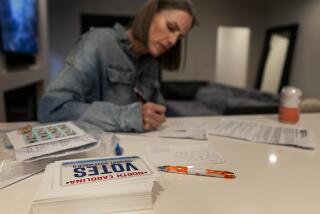Recalling first-class kindness
- Share via
The Postal Service may be fading away, but I have a memory of it and one of its employees that will never be marked “Return to Sender.”
This was an incident from the late 1960s, an era of economic anxiety, fear and xenophobia. My father, who immigrated to the United States from Israel in 1962, had a spirit that was buoyed by patriotic participation in baseball, voting and his excitement about mailing a letter to a friend with a new stamp. He got a little confused one day, however, when he brought home a batch of green trading stamps after a shopping spree for his favorite things — automotive parts. Merchants gave out the stamps as a reward to customers based on the amount of purchase, much like the points programs that credit card companies offer today. Dad innocently put a mercantile sticker on each of the four letters he was sending out that day.
Two days later, a uniformed postal official came by the house with a twinkle in his eye but duty in his demeanor. My parents were nervous at first, but the man assured them that they were not in trouble. We all sat down in our small living room as the man spoke: “Mr. Kamin, you have wonderful handwriting, and I’m glad you printed your return address so clearly on these letters. But these green stamps are, well, not for postage. I know you meant well, sir. These are trading stamps that you put in books for use at a redemption center.”
He explained about the redemption center and then presented my red-faced father with four U.S. 13-cent first-class stamps. “Here, these are gifts from the United States government. You are a fine citizen.”
My father never looked more relieved or proud — not even on the day he received his master’s degree in aerospace science from the University of Cincinnati.
More than 40 years later, another generation of Americans works to protect our own children from terror and hatred, cynicism about government and the poor social manners that prevail in schools and stores and across the Internet. Today, writing a letter and sending it with a stamp is a lost art. And maybe, so too, are acts like that of the post office supervisor who came to talk to my father.
I hold on to my father’s journals of poetry, along with my respect for words, stamps and simple acts of humanity that inform me and my father’s memory — and soon, the memory of the post office itself.
Ben Kamin is the author, most recently, of “Nothing Like Sunshine: A Story in the Aftermath of the MLK Assassination.”
More to Read
A cure for the common opinion
Get thought-provoking perspectives with our weekly newsletter.
You may occasionally receive promotional content from the Los Angeles Times.






